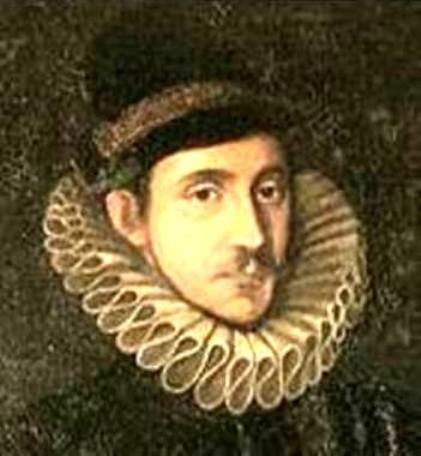 |
| Greville |
The source of this "Master" statement was not Greville directly, but English poet and playwright William Davenant—rumored godson, or even biological son, of Shakespeare—supposedly speaking of Greville.3
The Davenant parentage rumors, in turn, may have originated with the Samuel Butler quote: "It seemed to him that he writ with the very same spirit that Shakespeare [did], and seemed content enough to be called his son."4
What the "Master" statement might mean, or why Shakespeare and Jonson would be mentioned together in this context, is open to question.
The title of The Master of Shakespeare (2007) by A. W. L. Saunders, a book supporting the proposition that Fulke Greville was the author of the works generally attributed to William Shakespeare,5 seems to derive indirectly from the David Lloyd reference.
Fulke Greville as Shakespeare
The U.K.-based Shakespearean Authorship Trust—established in 1922 to "seek, and if possible establish, the truth concerning the authorship of Shakespeare's plays and poems"6—includes Greville in its list of potential authors.7Greville ranked tenth in a top-ten list of "the most notable possible authors of the works of Shakespeare" determined by TopTenz.net in September 2011.8 Included in the list were other lesser-known authorship candidates: Henry Neville, Mary Sidney Herbert, William Stanley, Roger Manners, and Emilia Lanier. They also included a group theory of authorship in their ranking. Topping the list were the better-known candidates: Christopher Marlowe, Francis Bacon, and Edward de Vere.9
Commenting on Thom Gunn's 2009 The Selected Poems of Fulke Greville, Robert Pinsky, Slate Magazine Poetry Editor and Poet Laureate Consultant in Poetry to the Library of Congress (United States Poet Laureate) 1997-2000, noted: "Greville is probably the greatest poet unknown to many readers. The force of his imagination, his driven intelligence and his eruptive cadences, merits comparison with Donne, Herbert and Shakespeare."10
SEE ALSO: Fulke Greville, Lord Brooke, 1554-1628: A Critical Biography by Joan Rees; University of California Press, 1971 - 238 pp.
1. full title: The states-men and favourites of England since the reformation : their prudence and policies, successes and miscarriages, advancements and falls; during the reigns of King Henry VIII. King Edward VI. Queen Mary. Queen Elizabeth King James. King Charles I (William and Mary Wolf Law Library)
2. Fulke Greville (1554-1628), Biography, Poetry Foundation.
3. "Greville's claim to be 'the master of Shakespeare'", Fulke Greville, Lord Brooke; Master of Shakespeare, September 14, 2007.
4. "Biography of Sir William Davenant", PoemHunter.com.
5. Saunders, A. W. L, The Master of Shakespeare, WorldCat Identities, 2007; 416 pp.
6. History/Mission, The Shakespeare Authorship Trust.
7. Other Candidates, The Shakespearean Authorship Trust.
8. prompted by the upcoming release of Anonymous, a major motion picture on the Shakespeare authorship question.
9. Andrews, Evan, "Top 10 Possible Authors For The Works of Shakespeare", TopTenz.net; September 2, 2011.
10. The Selected Poems of Fulke Greville, edited with an introduction by Thom Gunn (and afterword by Bradin Cormack), The University of Chicago Press, 1969, 2009; 184 pp.

No comments:
Post a Comment